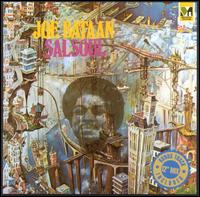An interview with musical legend Joe Bataan
Joe Bataan is a living legend. You may never have heard of him, but he is, in his own words, an underground cult favourite. From Boogaloo (Latin Soul) to Disco to Hip Hop, Joe has been there and back, always an innovator yet never receiving mainstream acclaim or commercial success. But after a 25-year hiatus, the man Gil Scott-Heron once called "The Mayor of the Neighbourhood" is back with 2 CDs, "Call My Name" and "The Message" (released on his own Joe-Bott Records imprint) and his very first DVD "Live in San Francisco."
Born Bataan Nitollano in 1942 to a Filipino father and an African American mother, Bataan spent his formative years in East Harlem soaking up the likes of Ray Charles and Tito Puente, among others. Following a stint in Coxsackie State Prison, Joe started to take a career in music seriously.
"I studied under the tutelage of Mark Francis from Juilliard. He started giving me insight into the other side of music, and I was determined to do something with it," Bataan said when I spoke to him by phone recently.
At this same time, records like Joe Cuba''s "Bang Bang" began to reflect a new sensibility: merging Latin music with the Soul music emerging out of Detroit and Philadelphia.
"The fusion of Latin and soul has always been my concept. Of bringing the masses together. With characteristic humility, Bataan admits: "I wasn't the greatest singer, but I had progressive ideas. If I had followed in the footsteps of, say, Curtis Mayfield or Tito Puente, I might have fallen short, but what I did was develop the Joe Bataan style. I combined it. I wrote my own songs and made my songs to fit my mood. They're not conventional songs. And that's what developed my style, especially the words that I use and my life experiences."
Bataan's first release was "Gypsy Woman" in 1966 on the Fania label. What followed were a string of classics such as "Ordinary Guy," “Subway Joe," and “Riot," detailing the ups and downs of life in the neighbourhood. Joe Bataan’s reputation as a "street troubadour" or "Mr. New York" was cemented with those releases.
"The songs I sing were dear to the people who know me,” he said. During this fertile period, Bataan also played with the likes of Tito Puente and Ray Barretto while also finding time to promote the first major Latin-soul concert at Shea Stadium. Unfortunately, it rained, and it was also the day that man landed on the moon.
As the seventies dawned, Joe took over ownership of the short-lived Ghetto Records label, leaving Fania Records behind. Something was also happening in the underground clubs of NYC: Disco. “I was at the forefront of something that is new", and in 1973 signed to the Cayre brothers’ Mericana label, Bataan recorded the legendary album "Salsoul", a term he also coined. The album became a phenomenon in New York City when WBLS DJ Frankie Crocker played nearly the entire album on his show, helping it sell 20,000 copies in NYC alone.
The combination of Salsa and Funk was impossible to resist, and “Mericana” was renamed "Salsoul." For many, the Salsoul label is not only the greatest Disco label of all time but emblematic of the entire Disco phenomenon itself. In an admittedly reckless business move, Bataan signed off on his rights to the label, and a very lucrative opportunity was missed. Still this didn''t deter his follow-up "Afro-Filipino" from being another dance floor classic which featured "La Botella" a version of Gil Scott-Heron''s the bottle a Latin Jazz masterpiece with a fantastic sax solo by David Sanborn.
|
|
When Disco peaked in the late seventies, Joe Bataan found new inspiration in Hip Hop. Recorded months before The Fatback Band's "King Tim 111," commonly referred to as the first Rap record, Joe shopped "Rap-O-Clap-O" around, but "every record company I took it to refused to listen to it," he said. It wasn't until The Sugar Hill Gang struck gold with "Rapper''s Delight" that Salsoul finally released it. Fast forward to 2006, and Joe Bataan is back. Recorded with producer Daniel Callas, "Call My Name" landed on many critics’ Top 10 list in 2005. In regards to its success, Bataan says that "some connection was made that was so gratifying it made me cry when I read some of the liner notes." |
As for the neighbourhood in 2006, “the mayor" has these observations: "It's like a melting pot in New York City. When I was growing up, the predominant music was either Puerto Rican or Cuban. Now you have all types of nationalities. The city is growing that way, but unfortunately, radio is not. We’re missing a lot of public radio. When a guy like me couldn't get airplay, we were always supported by public radio."
Currently, Joe Bataan works as a counsellor for incarcerated youth, giving back to the neighbourhood he has so eloquently chronicled. As for his revived music career, Joe Bataan has this final word: "I share a lot of information on stage. I'm gratified that I have a chance to keep singing. God has blessed me, and I am on a mission to do his work and perform well and help other people".


